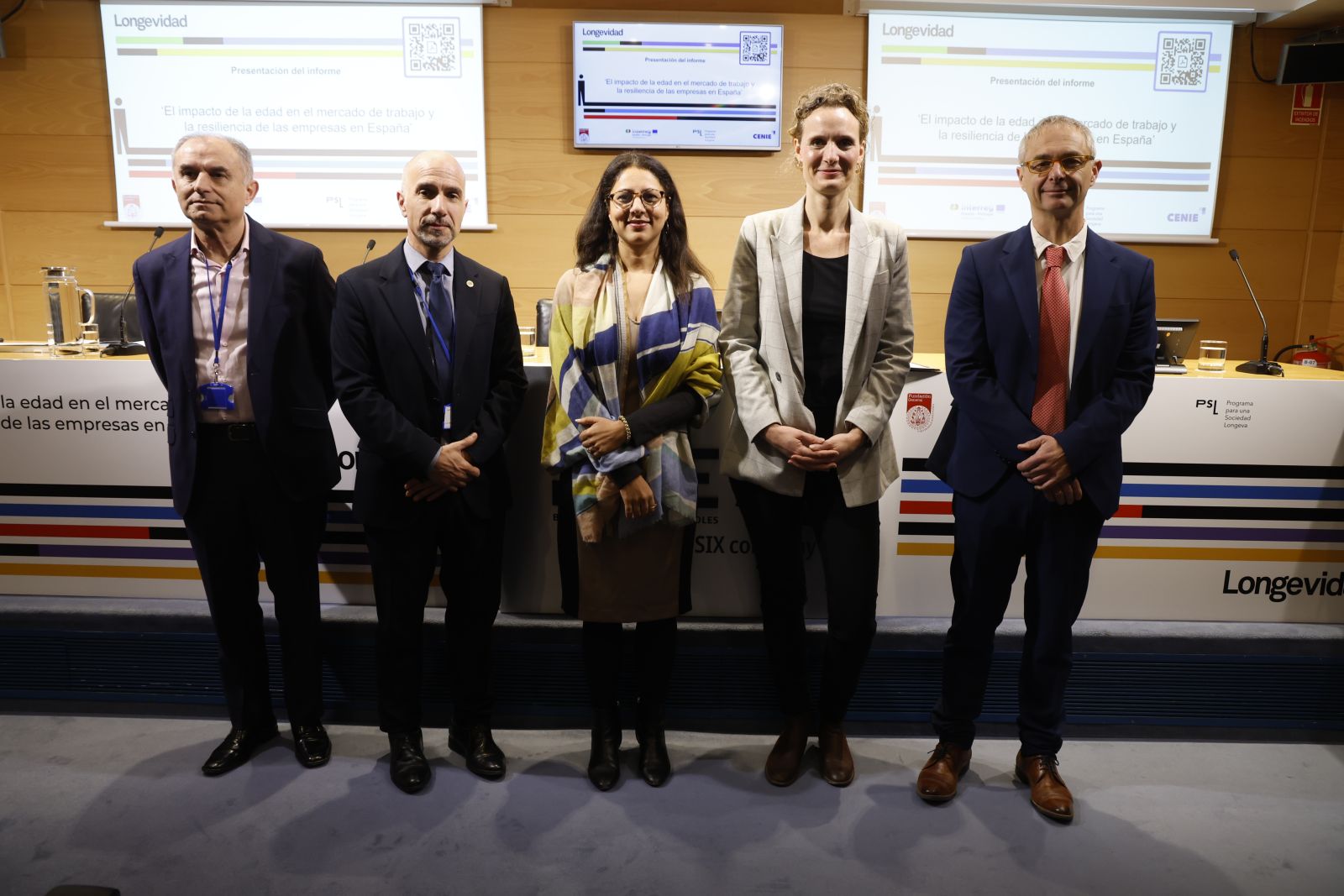Actividades
Older workers in the labour market create more resilient and robust economies in the face of crises

Spain, like many other developed economies, faces the challenge of an ageing population. The number of people over the age of 50 is expected to represent around half of Spain's population by 2050. This is stated in the study "The impact of longevity workforce on Spain´s economy and its resilience", presented on 25 January at the Palacio de la Bolsa, Madrid, a CENIE report, prepared by the leading international analysis firm Oxford Economics in collaboration with the University of Salamanca, which analyses how having a workforce that includes older workers has a positive influence on different economic results of companies. One of the main contributions of the report is the finding that "an older workforce positively increased-influenced the economic resilience (sales, employment, productivity and investment) of Spanish companies during the Great Recession experienced between 2008 and 2014", so that "promoting the participation of older workers in the workforce creates stronger economies in the face of crises".

This research is part of the project "Programme for a long-lived society", an initiative approved under the INTERREG V-A Programme, Spain-Portugal, 2014-2020, POCTEP, of the European Regional Development Fund (ERDF).
The document shows that, in the case of Spain, companies with an older workforce experienced an increase in sales, employment, productivity and a higher net investment rate during the Great Recession. This is because older workers tend to have more experience, knowledge and skills, making the firms in which they work more productive and resilient to shocks.
PRESENTATION, CONSIDERATIONS AND CONTEXT
The presentation of the study's findings took place at the Palacio de la Bolsa in Madrid and was opened by Shruti Singh, Senior Economist in the Skills and Employability Division of the OECD's Directorate for Employment, Labour and Social Affairs, who pointed out that "Spain is one of the OECD's rapidly ageing countries. Providing greater employment opportunities and investing in the talents of older workers will be key to the success of the Spanish economy and individual well-being. Addressing barriers to employment, including age discrimination in recruitment and vocational training, and adopting a lifelong approach that helps people develop their skills and stay healthy, even as they grow older, will be a crucial part of the policy response to an ageing workforce".
Ricardo Rivero Ortega, Rector of the University of Salamanca, highlighted "the importance of the report in highlighting the participation of older workers in the economy. A proof that the experience and work of these people enriches our country, economically and socially".

Óscar González Benito, director of the General Foundation of the University of Salamanca and professor at the Faculty of Economics and Business, together with Johanna Neuhoff, associate director for economic consulting services at Oxford Economics for Europe, were in charge of presenting the scope and conclusions of the report.
In this regard, Óscar González Benito explained that "the results of the study contribute to overthrowing false stereotypes that conceive of 'seniors' as a burden, rather than as a value for the labour markets; 'seniors' bring experience, solvency and temperance that make the business fabric more resilient". Johanna Neuhoff said: "Our research has shown that Spanish companies with an active long-lived workforce have been more resilient during the Great Recession. Seeing the long-lived workforce as an opportunity and actively promoting their participation in the labour market can prepare the Spanish economy for new crises".
Olimpia del Águila Cazorla, Head of Social Security and Equality at the CEOE; Cristina Estévez Navarro, Secretary of Institutional Policy and Territorial Policies of the Confederal Executive Committee (UGT-CEC) and Carlos Bravo Fernández, Confederal Secretary of Public Policies and Social Protection of the CCOO, participated in the analysis and discussion of the study.
Olimpia del Águila Cazorla, head of the Social Security and Equality areas of the CEOE, stressed that "these reports make us not forget that there are four generations working" and that in order to "eliminate the lack of protection that exists" one of the tools is "cultural change". On this subject, Cristina Estévez Navarro, Secretary for Institutional Policy and Territorial Policies of the Confederal Executive Committee (UGT-CEC), highlighted the "challenges posed by ageing" in the labour market and that "the fundamental thing is that companies want to have this older talent" in their workforces.
For his part, Carlos Bravo Fernández, Confederal Secretary of Public Policies and Social Protection of the CCOO, stated that "the report has interesting ideas" such as "insisting on training" for senior workers and "generating rules to eliminate discrimination" based on age.
This round table debate and conversation was moderated by Pablo Antonio Muñoz Gallego, Professor of Economics at the University of Salamanca and CENIE researcher, who proposed that "companies and workers must be active in taking advantage of the synergies that are generated in intergenerational workforces. With a clear commitment to investment in training throughout working life, in technology and in professional development plans until retirement age. We must ask the social partners and administrations to clearly establish a framework of incentives to facilitate this process. Long-lived societies must be encouraged to become prosperous and innovative societies".
THE STUDY'S POLICY RECOMMENDATIONS
The report notes that a shrinking labour force combined with an increase in the number of retirees could slow economic growth and strain the pension system. These challenges would potentially affect the whole of society, not just the elderly.
The report also highlights that Spain has a low employment rate among people aged 55 and over, a situation that will be exacerbated by an ageing population. To reap the benefits of a long-lived workforce, Spain must take urgent measures to increase the participation of older workers in the labour market. These measures could include:
- Rethinking the work cycle. The report suggests that policymakers should ensure that workers maintain their interest in working as they age. One option, it explains, could be to raise the retirement age and discourage early retirement. "Responsible authorities in Spain could consider increasing the costs of early retirement for employers or abolishing early retirement altogether.
Improve the quality and working environment for older workers. The responsible authorities should improve the quality of the working environment for older workers by introducing, for example, regulations that specifically aim to protect older workers through workplace safety guidelines. Another measure would be to "promote opportunities for retraining and further training, with governments subsidising training programmes for older employees to encourage employers to develop such programmes" - Improving the labour market situation of older workers. Here, the report states that policymakers should aim primarily to reduce the risk of unemployment for older workers by reducing the probability of becoming unemployed and by reducing the likely duration of unemployment. "Policy makers can help reduce the expected duration of unemployment by setting up active employment programmes, such as those with a special focus on helping older unemployed workers to find work more quickly.
Motivate firms to hire and retain older workers. The report calls on policymakers to ensure not only that older workers want to stay in work, but also that firms are willing to retain and hire them. Key initiatives include: eliminating age discrimination in recruitment, promotion or retention processes; introducing financial incentives to motivate companies to hire and retain older workers; and motivating companies to implement age management practices.
This conference is part of the series Notes for a long-lived society, which aims to lay the scientific foundations and be the starting point for future CENIE research within the framework of the New Long-Lived Societies project (INTERREG VI-A Programme, Spain-Portugal, POCTEP, 2021-2027, of the European Regional Development Fund, ERDF).
Download complete report HERE
